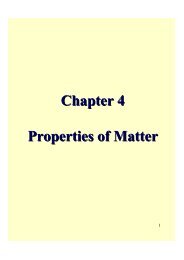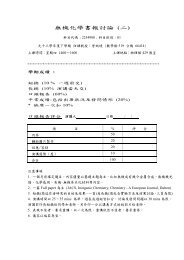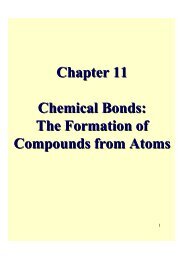- Page 1 and 2:
MOLPRO Users Manual Version 2010.1
- Page 3 and 4:
ii • Møller-Plesset perturbation
- Page 5 and 6: iv 3. Explicitly correlated LMP2-F1
- Page 7 and 8: vi The original reference to uncont
- Page 9 and 10: viii Rangehybrid methods: T. Leinin
- Page 11 and 12: CONTENTS x 4.12 Summary of keywords
- Page 13 and 14: CONTENTS xii 10.4 Geometry Files .
- Page 15 and 16: CONTENTS xiv 16.9.4 Sanity check on
- Page 17 and 18: CONTENTS xvi 19.5.1 Defining the st
- Page 19 and 20: CONTENTS xviii 20.4 Miscellaneous t
- Page 21 and 22: CONTENTS xx 29.6.3 Manually Definin
- Page 23 and 24: CONTENTS xxii 34.1.5 Printing optio
- Page 25 and 26: CONTENTS xxiv 39.10Point group symm
- Page 27 and 28: CONTENTS xxvi 42.2.7 Numerical Hess
- Page 29 and 30: CONTENTS xxviii 53 QM/MM INTERFACES
- Page 31 and 32: CONTENTS xxx A.3.11 Fedora 13 (32-b
- Page 33 and 34: CONTENTS xxxii C.41 THGFL: . . . .
- Page 35 and 36: 2 RUNNING MOLPRO 2 of directories o
- Page 37 and 38: 2 RUNNING MOLPRO 4 also some parts
- Page 39 and 40: 2 RUNNING MOLPRO 6 Note that option
- Page 41 and 42: 3 DEFINITION OF MOLPRO INPUT LANGUA
- Page 43 and 44: 3 DEFINITION OF MOLPRO INPUT LANGUA
- Page 45 and 46: 3 DEFINITION OF MOLPRO INPUT LANGUA
- Page 47 and 48: 4 GENERAL PROGRAM STRUCTURE 14 Glob
- Page 49 and 50: 4 GENERAL PROGRAM STRUCTURE 16 in d
- Page 51 and 52: 4 GENERAL PROGRAM STRUCTURE 18 Tabl
- Page 53 and 54: 4 GENERAL PROGRAM STRUCTURE 20 tion
- Page 55: 4 GENERAL PROGRAM STRUCTURE 22 Prog
- Page 59 and 60: 5 INTRODUCTORY EXAMPLES 26 In the a
- Page 61 and 62: 5 INTRODUCTORY EXAMPLES 28 5.7 Proc
- Page 63 and 64: 6 PROGRAM CONTROL 30 ***,h2o benchm
- Page 65 and 66: 6 PROGRAM CONTROL 32 6.5 Allocating
- Page 67 and 68: 6 PROGRAM CONTROL 34 6.7.1 IF state
- Page 69 and 70: 6 PROGRAM CONTROL 36 Certain import
- Page 71 and 72: 6 PROGRAM CONTROL 38 ZERO ONEINT TW
- Page 73 and 74: 6 PROGRAM CONTROL 40 6.13.1 Example
- Page 75 and 76: 6 PROGRAM CONTROL 42 Table 5: One-e
- Page 77 and 78: 7 FILE HANDLING 44 7.4 DATA The DAT
- Page 79 and 80: 8 VARIABLES 46 Numbers: Logicals: S
- Page 81 and 82: 8 VARIABLES 48 8.4 System variables
- Page 83 and 84: 8 VARIABLES 50 are valid variable d
- Page 85 and 86: 8 VARIABLES 52 CM=1.d0/219474.63067
- Page 87 and 88: 8 VARIABLES 54 DEL4 ∇ 4 DARWIN Da
- Page 89 and 90: 8 VARIABLES 56 CHARGE NELEC SPIN CI
- Page 91 and 92: 9 TABLES AND PLOTTING 58 8.11 Readi
- Page 93 and 94: 9 TABLES AND PLOTTING 60 plotted; i
- Page 95 and 96: 10 MOLECULAR GEOMETRY 62 PLANEXZ z-
- Page 97 and 98: 10 MOLECULAR GEOMETRY 64 geometry s
- Page 99 and 100: 10 MOLECULAR GEOMETRY 66 ***,H2O ge
- Page 101 and 102: 10 MOLECULAR GEOMETRY 68 entries. D
- Page 103 and 104: 11 BASIS INPUT 70 resolution in exp
- Page 105 and 106: 11 BASIS INPUT 72 • The Binning/C
- Page 107 and 108:
11 BASIS INPUT 74 The specification
- Page 109 and 110:
11 BASIS INPUT 76 the exponents of
- Page 111 and 112:
11 BASIS INPUT 78 ***,h2o geom={o;
- Page 113 and 114:
12 EFFECTIVE CORE POTENTIALS 80 is
- Page 115 and 116:
13 CORE POLARIZATION POTENTIALS 82
- Page 117 and 118:
14 INTEGRATION 84 14.1 Sorted integ
- Page 119 and 120:
14 INTEGRATION 86 smaller than this
- Page 121 and 122:
14 INTEGRATION 88 THR D3EXT THREST
- Page 123 and 124:
14 INTEGRATION 90 THRQ2 LMP2 THRAO
- Page 125 and 126:
14 INTEGRATION 92 Table 7: Default
- Page 127 and 128:
15 DENSITY FITTING 94 DF-HF,DF_BASI
- Page 129 and 130:
15 DENSITY FITTING 96 LOCFIT F12 LO
- Page 131 and 132:
16 THE SCF PROGRAM 98 16 THE SCF PR
- Page 133 and 134:
16 THE SCF PROGRAM 100 16.1.4 Optio
- Page 135 and 136:
16 THE SCF PROGRAM 102 16.3 Saving
- Page 137 and 138:
16 THE SCF PROGRAM 104 r1=1.85,r2=1
- Page 139 and 140:
16 THE SCF PROGRAM 106 16.9.1 Level
- Page 141 and 142:
17 THE DENSITY FUNCTIONAL PROGRAM 1
- Page 143 and 144:
17 THE DENSITY FUNCTIONAL PROGRAM 1
- Page 145 and 146:
17 THE DENSITY FUNCTIONAL PROGRAM 1
- Page 147 and 148:
17 THE DENSITY FUNCTIONAL PROGRAM 1
- Page 149 and 150:
17 THE DENSITY FUNCTIONAL PROGRAM 1
- Page 151 and 152:
17 THE DENSITY FUNCTIONAL PROGRAM 1
- Page 153 and 154:
17 THE DENSITY FUNCTIONAL PROGRAM 1
- Page 155 and 156:
17 THE DENSITY FUNCTIONAL PROGRAM 1
- Page 157 and 158:
18 ORBITAL LOCALIZATION 124 geometr
- Page 159 and 160:
18 ORBITAL LOCALIZATION 126 GROUP,3
- Page 161 and 162:
18 ORBITAL LOCALIZATION 128 18.9 Op
- Page 163 and 164:
19 THE MCSCF PROGRAM MULTI 130 f) c
- Page 165 and 166:
19 THE MCSCF PROGRAM MULTI 132 19.3
- Page 167 and 168:
19 THE MCSCF PROGRAM MULTI 134 WF,6
- Page 169 and 170:
19 THE MCSCF PROGRAM MULTI 136 19.5
- Page 171 and 172:
19 THE MCSCF PROGRAM MULTI 138 or C
- Page 173 and 174:
19 THE MCSCF PROGRAM MULTI 140 19.6
- Page 175 and 176:
19 THE MCSCF PROGRAM MULTI 142 19.8
- Page 177 and 178:
19 THE MCSCF PROGRAM MULTI 144 icst
- Page 179 and 180:
19 THE MCSCF PROGRAM MULTI 146 19.9
- Page 181 and 182:
20 THE CI PROGRAM 148 ***,N2 geomet
- Page 183 and 184:
20 THE CI PROGRAM 150 and double ex
- Page 185 and 186:
20 THE CI PROGRAM 152 refstat: mxsh
- Page 187 and 188:
20 THE CI PROGRAM 154 Default is to
- Page 189 and 190:
20 THE CI PROGRAM 156 20.3.8 Restri
- Page 191 and 192:
20 THE CI PROGRAM 158 DM and NATORB
- Page 193 and 194:
20 THE CI PROGRAM 160 ZERO: THRDLP:
- Page 195 and 196:
20 THE CI PROGRAM 162 PAIRS=1: prin
- Page 197 and 198:
20 THE CI PROGRAM 164 problem is to
- Page 199 and 200:
21 MULTIREFERENCE RAYLEIGH SCHRÖDI
- Page 201 and 202:
21 MULTIREFERENCE RAYLEIGH SCHRÖDI
- Page 203 and 204:
21 MULTIREFERENCE RAYLEIGH SCHRÖDI
- Page 205 and 206:
21 MULTIREFERENCE RAYLEIGH SCHRÖDI
- Page 207 and 208:
21 MULTIREFERENCE RAYLEIGH SCHRÖDI
- Page 209 and 210:
22 NEVPT2 CALCULATIONS 176 IHINT=0
- Page 211 and 212:
23 MØLLER PLESSET PERTURBATION THE
- Page 213 and 214:
23 MØLLER PLESSET PERTURBATION THE
- Page 215 and 216:
24 THE CLOSED SHELL CCSD PROGRAM 18
- Page 217 and 218:
24 THE CLOSED SHELL CCSD PROGRAM 18
- Page 219 and 220:
24 THE CLOSED SHELL CCSD PROGRAM 18
- Page 221 and 222:
25 EXCITED STATES WITH EQUATION-OF-
- Page 223 and 224:
25 EXCITED STATES WITH EQUATION-OF-
- Page 225 and 226:
25 EXCITED STATES WITH EQUATION-OF-
- Page 227 and 228:
25 EXCITED STATES WITH EQUATION-OF-
- Page 229 and 230:
27 THE MRCC PROGRAM OF M. KALLAY (M
- Page 231 and 232:
27 THE MRCC PROGRAM OF M. KALLAY (M
- Page 233 and 234:
27 THE MRCC PROGRAM OF M. KALLAY (M
- Page 235 and 236:
28 SMILES 202 This code is not incl
- Page 237 and 238:
29 LOCAL CORRELATION TREATMENTS 204
- Page 239 and 240:
29 LOCAL CORRELATION TREATMENTS 206
- Page 241 and 242:
29 LOCAL CORRELATION TREATMENTS 208
- Page 243 and 244:
29 LOCAL CORRELATION TREATMENTS 210
- Page 245 and 246:
29 LOCAL CORRELATION TREATMENTS 212
- Page 247 and 248:
29 LOCAL CORRELATION TREATMENTS 214
- Page 249 and 250:
29 LOCAL CORRELATION TREATMENTS 216
- Page 251 and 252:
29 LOCAL CORRELATION TREATMENTS 218
- Page 253 and 254:
29 LOCAL CORRELATION TREATMENTS 220
- Page 255 and 256:
29 LOCAL CORRELATION TREATMENTS 222
- Page 257 and 258:
30 LOCAL METHODS FOR EXCITED STATES
- Page 259 and 260:
30 LOCAL METHODS FOR EXCITED STATES
- Page 261 and 262:
31 EXPLICITLY CORRELATED METHODS 22
- Page 263 and 264:
31 EXPLICITLY CORRELATED METHODS 23
- Page 265 and 266:
31 EXPLICITLY CORRELATED METHODS 23
- Page 267 and 268:
31 EXPLICITLY CORRELATED METHODS 23
- Page 269 and 270:
31 EXPLICITLY CORRELATED METHODS 23
- Page 271 and 272:
31 EXPLICITLY CORRELATED METHODS 23
- Page 273 and 274:
31 EXPLICITLY CORRELATED METHODS 24
- Page 275 and 276:
31 EXPLICITLY CORRELATED METHODS 24
- Page 277 and 278:
32 THE FULL CI PROGRAM 244 32 THE F
- Page 279 and 280:
33 SYMMETRY-ADAPTED INTERMOLECULAR
- Page 281 and 282:
33 SYMMETRY-ADAPTED INTERMOLECULAR
- Page 283 and 284:
33 SYMMETRY-ADAPTED INTERMOLECULAR
- Page 285 and 286:
33 SYMMETRY-ADAPTED INTERMOLECULAR
- Page 287 and 288:
33 SYMMETRY-ADAPTED INTERMOLECULAR
- Page 289 and 290:
34 PROPERTIES AND EXPECTATION VALUE
- Page 291 and 292:
34 PROPERTIES AND EXPECTATION VALUE
- Page 293 and 294:
34 PROPERTIES AND EXPECTATION VALUE
- Page 295 and 296:
34 PROPERTIES AND EXPECTATION VALUE
- Page 297 and 298:
34 PROPERTIES AND EXPECTATION VALUE
- Page 299 and 300:
34 PROPERTIES AND EXPECTATION VALUE
- Page 301 and 302:
35 RELATIVISTIC CORRECTIONS 268 •
- Page 303 and 304:
36 DIABATIC ORBITALS 270 This proce
- Page 305 and 306:
37 NON ADIABATIC COUPLING MATRIX EL
- Page 307 and 308:
38 QUASI-DIABATIZATION 274 This cal
- Page 309 and 310:
38 QUASI-DIABATIZATION 276 ***,h2s
- Page 311 and 312:
38 QUASI-DIABATIZATION 278 ***,h2s
- Page 313 and 314:
39 THE VB PROGRAM CASVB 280 39 THE
- Page 315 and 316:
39 THE VB PROGRAM CASVB 282 configu
- Page 317 and 318:
39 THE VB PROGRAM CASVB 284 be proj
- Page 319 and 320:
39 THE VB PROGRAM CASVB 286 The lis
- Page 321 and 322:
39 THE VB PROGRAM CASVB 288 This ke
- Page 323 and 324:
39 THE VB PROGRAM CASVB 290 to writ
- Page 325 and 326:
40 SPIN-ORBIT-COUPLING 292 integral
- Page 327 and 328:
40 SPIN-ORBIT-COUPLING 294 40.6.1 P
- Page 329 and 330:
40 SPIN-ORBIT-COUPLING 296
- Page 331 and 332:
41 ENERGY GRADIENTS 298 41 ENERGY G
- Page 333 and 334:
41 ENERGY GRADIENTS 300 state2) and
- Page 335 and 336:
41 ENERGY GRADIENTS 302 ZMAT OPT3N
- Page 337 and 338:
42 GEOMETRY OPTIMIZATION (OPTG) 304
- Page 339 and 340:
42 GEOMETRY OPTIMIZATION (OPTG) 306
- Page 341 and 342:
42 GEOMETRY OPTIMIZATION (OPTG) 308
- Page 343 and 344:
42 GEOMETRY OPTIMIZATION (OPTG) 310
- Page 345 and 346:
42 GEOMETRY OPTIMIZATION (OPTG) 312
- Page 347 and 348:
42 GEOMETRY OPTIMIZATION (OPTG) 314
- Page 349 and 350:
42 GEOMETRY OPTIMIZATION (OPTG) 316
- Page 351 and 352:
42 GEOMETRY OPTIMIZATION (OPTG) 318
- Page 353 and 354:
42 GEOMETRY OPTIMIZATION (OPTG) 320
- Page 355 and 356:
42 GEOMETRY OPTIMIZATION (OPTG) 322
- Page 357 and 358:
42 GEOMETRY OPTIMIZATION (OPTG) 324
- Page 359 and 360:
42 GEOMETRY OPTIMIZATION (OPTG) 326
- Page 361 and 362:
42 GEOMETRY OPTIMIZATION (OPTG) 328
- Page 363 and 364:
42 GEOMETRY OPTIMIZATION (OPTG) 330
- Page 365 and 366:
42 GEOMETRY OPTIMIZATION (OPTG) 332
- Page 367 and 368:
43 VIBRATIONAL FREQUENCIES (FREQUEN
- Page 369 and 370:
43 VIBRATIONAL FREQUENCIES (FREQUEN
- Page 371 and 372:
43 VIBRATIONAL FREQUENCIES (FREQUEN
- Page 373 and 374:
45 MINIMIZATION OF FUNCTIONS 340 45
- Page 375 and 376:
45 MINIMIZATION OF FUNCTIONS 342 **
- Page 377 and 378:
46 BASIS SET EXTRAPOLATION 344 extr
- Page 379 and 380:
46 BASIS SET EXTRAPOLATION 346 ***,
- Page 381 and 382:
46 BASIS SET EXTRAPOLATION 348 46.3
- Page 383 and 384:
46 BASIS SET EXTRAPOLATION 350 geom
- Page 385 and 386:
47 POTENTIAL ENERGY SURFACES (SURF)
- Page 387 and 388:
47 POTENTIAL ENERGY SURFACES (SURF)
- Page 389 and 390:
47 POTENTIAL ENERGY SURFACES (SURF)
- Page 391 and 392:
47 POTENTIAL ENERGY SURFACES (SURF)
- Page 393 and 394:
47 POTENTIAL ENERGY SURFACES (SURF)
- Page 395 and 396:
48 POLYNOMIAL REPRESENTATIONS (POLY
- Page 397 and 398:
49 THE VSCF PROGRAM (VSCF) 364 THER
- Page 399 and 400:
50 THE VCI PROGRAM (VCI) 366 CITHR=
- Page 401 and 402:
50 THE VCI PROGRAM (VCI) 368 surf,s
- Page 403 and 404:
52 THE COSMO MODEL 370 52 THE COSMO
- Page 405 and 406:
52 THE COSMO MODEL 372 or using the
- Page 407 and 408:
54 THE TDHF AND TDKS PROGRAMS 374 o
- Page 409 and 410:
55 ORBITAL MERGING 376 MOVE command
- Page 411 and 412:
55 ORBITAL MERGING 378 55.13 Exampl
- Page 413 and 414:
56 MATRIX OPERATIONS 380 ***,NO mer
- Page 415 and 416:
56 MATRIX OPERATIONS 382 56.2 Loadi
- Page 417 and 418:
56 MATRIX OPERATIONS 384 If NATURAL
- Page 419 and 420:
56 MATRIX OPERATIONS 386 56.14 Form
- Page 421 and 422:
56 MATRIX OPERATIONS 388 ***,h2o ma
- Page 423 and 424:
A INSTALLATION GUIDE 390 the result
- Page 425 and 426:
A INSTALLATION GUIDE 392 For IA32 L
- Page 427 and 428:
A INSTALLATION GUIDE 394 3. If any
- Page 429 and 430:
A INSTALLATION GUIDE 396 -gfortran
- Page 431 and 432:
A INSTALLATION GUIDE 398 A.3.7 Test
- Page 433 and 434:
A INSTALLATION GUIDE 400 --noverbos
- Page 435 and 436:
A INSTALLATION GUIDE 402 A.3.12 ope
- Page 437 and 438:
A INSTALLATION GUIDE 404 A.3.14 Ins
- Page 439 and 440:
B RECENT CHANGES 406 B.1.4 New basi
- Page 441 and 442:
B RECENT CHANGES 408 1) · exp(−9
- Page 443 and 444:
B RECENT CHANGES 410 B.4 New featur
- Page 445 and 446:
B RECENT CHANGES 412 5. Multipole m
- Page 447 and 448:
C DENSITY FUNCTIONAL DESCRIPTIONS 4
- Page 449 and 450:
C DENSITY FUNCTIONAL DESCRIPTIONS 4
- Page 451 and 452:
C DENSITY FUNCTIONAL DESCRIPTIONS 4
- Page 453 and 454:
C DENSITY FUNCTIONAL DESCRIPTIONS 4
- Page 455 and 456:
C DENSITY FUNCTIONAL DESCRIPTIONS 4
- Page 457 and 458:
C DENSITY FUNCTIONAL DESCRIPTIONS 4
- Page 459 and 460:
C DENSITY FUNCTIONAL DESCRIPTIONS 4
- Page 461 and 462:
C DENSITY FUNCTIONAL DESCRIPTIONS 4
- Page 463 and 464:
C DENSITY FUNCTIONAL DESCRIPTIONS 4
- Page 465 and 466:
C DENSITY FUNCTIONAL DESCRIPTIONS 4
- Page 467 and 468:
+ 9 8 (1 − ζ ) 4/3 C DENSITY FUN
- Page 469 and 470:
C DENSITY FUNCTIONAL DESCRIPTIONS 4
- Page 471 and 472:
C DENSITY FUNCTIONAL DESCRIPTIONS 4
- Page 473 and 474:
C DENSITY FUNCTIONAL DESCRIPTIONS 4
- Page 475 and 476:
C DENSITY FUNCTIONAL DESCRIPTIONS 4
- Page 477 and 478:
C DENSITY FUNCTIONAL DESCRIPTIONS 4
- Page 479 and 480:
C DENSITY FUNCTIONAL DESCRIPTIONS 4
- Page 481 and 482:
C DENSITY FUNCTIONAL DESCRIPTIONS 4
- Page 483 and 484:
C DENSITY FUNCTIONAL DESCRIPTIONS 4
- Page 485 and 486:
C DENSITY FUNCTIONAL DESCRIPTIONS 4
- Page 487 and 488:
C DENSITY FUNCTIONAL DESCRIPTIONS 4
- Page 489 and 490:
D LICENSE INFORMATION 456 D.1 BLAS
- Page 491 and 492:
D LICENSE INFORMATION 458 D.3 Boost
- Page 493 and 494:
INDEX 460 DFTTHRESH, 109 Difference
- Page 495 and 496:
INDEX 462 NOGPRINT, 38 NOGRIDSAVE,



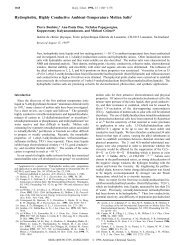
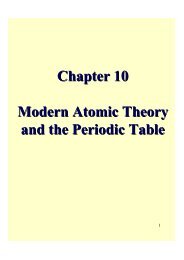
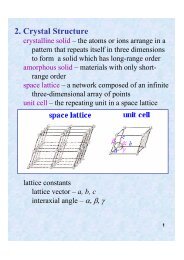

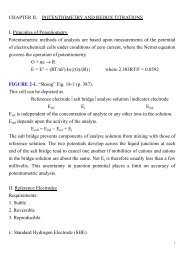
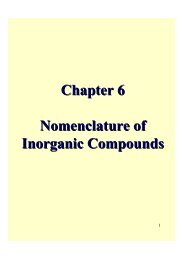
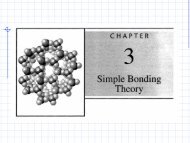
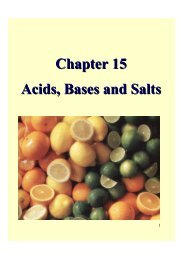
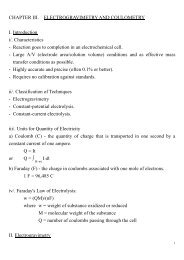
![Hetero [6+3] Cycloaddition of Fulvenes with N-Alkylidene Glycine ...](https://img.yumpu.com/35423358/1/190x245/hetero-6-3-cycloaddition-of-fulvenes-with-n-alkylidene-glycine-.jpg?quality=85)
